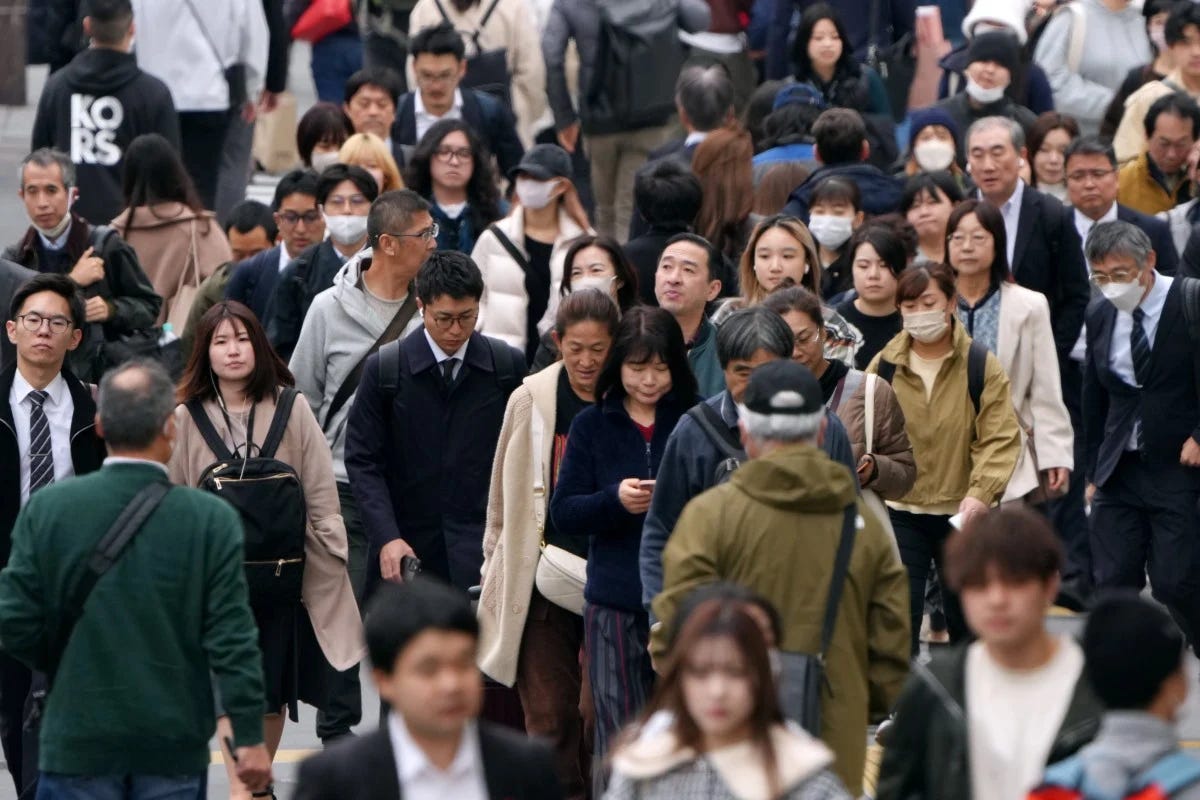SEA & World Briefing: Japan's Labor Shift, Thai Condo Boom, Singapore's COVID-19 Surge, and Malaysia's Embrace of Inclusivity
This edition’s date: 20 December 2023
Welcome to Wednesday, readers!
This week has been light on the news cycle as most people are taking a break, and I hope you are doing that now (or soon). That is why the Geopolitics section is not there today, and I'd never put minor stories for us all to waste time on.
For the stories, Japan decided to significantly increase its intake of Indonesian migrant workers to address the labour shortage. Meanwhile, the Thai real estate market witnessed a surge in foreign investment, predominantly from Chinese and Russian buyers.
Let’s get right into it!
Tables of Contents and Summaries
🇯🇵 Japan Set to Quadruple Indonesian Migrant Worker Intake Amid Labor Shortages
Japan plans to increase Indonesian migrant workers fourfold to address labor shortages. Indonesian workers face high training costs and adaptation challenges, while Japan needs to accommodate foreign labor needs better.
🇹🇭 Chinese and Russian Buyers Dominate Thai Condo Market
Chinese and Russian nationals lead foreign condo purchases in Thailand, with a 38% increase in sales. This reflects growing foreign investment and interest in Thailand's property market, spurred by tourism and economic policies.
🇸🇬 Singapore Ramps Up COVID-19 Response Amid Case Surge
Singapore intensifies its COVID-19 measures as cases exceed 56,000. The focus is on managing healthcare capacity and urging public responsibility, with an emphasis on vaccination and protection of vulnerable groups.
🇲🇾 Malaysia Lifts Ban on Festive Greetings for Halal Bakeries
Malaysia reverses a 2020 directive, allowing halal-certified bakeries to display and write festive greetings of all faiths. This move has been positively received, reflecting a more inclusive approach to religious expressions.
Cool Readings Beyond the Briefs
“Pope Francis Allows Priests to Bless Same-Sex Couples” from the New York Times**
“In Rightward Shift, New Zealand Reconsiders Pro-Maori Policies” from the New York Times**
The newly elected conservative government in New Zealand proposes policies that undermine Māori rights, including scrapping a Māori health agency and reducing the use of the Māori language in public agencies.
Social/Economic
Japan Set to Quadruple Indonesian Migrant Worker Intake Amid Labor Shortages
Japan anticipates a fourfold increase in Indonesian migrant workers in the next few years, aiming to ease labour shortages caused by its ageing population.
Indonesia plans to send 100,000 more workers to Japan within five years, using app-based systems for job matching.
Japan's Specified Skilled Workers (SSW) program and Technical Intern Training Program (TITP) are popular routes for foreigners to enter its labour market.
Demographic Dividend for Indonesia: Indonesia seeks to leverage its youthful workforce and reduce its 5.32% unemployment rate by sending workers abroad.
Indonesians are significant contributors to Japan's foreign workforce, with record numbers arriving under the SSW scheme.
Young Indonesians view working in Japan as a lucrative opportunity, despite the challenges of language and adaptation.
High Training Costs for Workers: Indonesian workers face substantial training costs, ranging from 30 to 70 million rupiah, to meet Japanese employment standards.
Issues of malpractice and mistreatment by employment agencies are concerns for migrant workers.
Adjusting to life and language in Japan remains a significant challenge for Indonesian workers.
Two-Way Adjustment Needed: Experts suggest Japan should also make efforts to accommodate foreign workers, particularly from Muslim-majority countries like Indonesia.
Japan's approach to foreign labour is seen as ambivalent, with programs like TITP criticized for exploitation risks.
Economic factors and policy decisions may influence the attractiveness of Japan for future migrant workers.
Chinese and Russian Buyers Dominate Thai Condo Market
Foreign buyers, predominantly Chinese and Russians, have significantly increased their purchases of condominiums in Thailand's tourist areas like Bangkok, Pattaya, and Phuket.
About 10,703 units, worth 52.3 billion baht, were sold in the first nine months of the year, marking a 38% increase from the previous year.
Chinese nationals purchased nearly 47% of the total condos sold, with a transaction value of 24.7 billion baht.
Diverse Buyer Demographics: Russians, Americans, and Taiwanese also featured prominently among foreign condo buyers in Thailand.
Chonburi province and Bangkok are the leading locations for these sales, highlighting their appeal to foreign investors and second-home buyers.
The trend reflects foreign interest in Thai condos for investment and as secondary residences.
Tourism as Economic Driver: Prime Minister Srettha Thavisin focuses on tourism, including visa waivers and improved airport operations, to boost economic growth and foreign property investment.
Visa waivers for countries like China and Russia are expected to further increase demand for condos, with foreign ownership still below legal limits.
The Tourism Authority of Thailand anticipates a rebound to 35 million visitors next year, potentially driving more condo sales.
Singapore Ramps Up COVID-19 Response Amid Case Surge
Singapore's COVID-19 cases rise above 56,000, prompting MOH to recommend mask-wearing in crowded places.
A second Covid-19 treatment facility at Singapore Expo Hall 10 will complement Crawfurd Hospital, increasing capacity to over 80 stable patients.
From December 19, MOH will provide daily updates on its website, shifting from its previous weekly schedule.
Underreported Cases: With routine Covid-19 testing phased out, the reported numbers likely understate the actual situation; MOH estimates higher infection rates.
Average daily hospitalizations and ICU cases have risen, linked to the JN.1 sublineage of Omicron subvariant BA.2.86.
Current data suggests no increased transmissibility or severity from JN.1 compared to other variants.
Healthcare Capacity Management: MOH and hospitals are deferring non-urgent procedures and exploring alternative care models to manage capacity.
MOH urges the public to exercise responsibility, particularly around the elderly and vulnerable, and to use emergency services judiciously.
Vaccination, especially recent ones, remains critical in preventing severe illness; MOH emphasizes the importance of staying up-to-date with shots.
People over 60, medically vulnerable individuals, and residents of aged care facilities are advised to get the updated vaccine.
Malaysia Lifts Ban on Festive Greetings for Halal Bakeries
Jakim, Malaysia's Islamic Development Department, now allows halal-certified bakeries to display and write festive greetings of all faiths.
Previously, a 2020 directive restricted halal-certified shops from publicly displaying food items with non-Muslim festive greetings.
The department clarifies that businesses with halal certification face no restrictions on writing any festive greetings on food items.
Local Impact: A bakery chain had earlier declined Christmas greetings on cakes due to fears of losing halal certification; now, such requests are accepted.
Sarawak's Premier criticizes the previous ban as "stupid," emphasizing that writing festive messages on cakes is not forbidden in Islam.
Sarawak's Premier highlights the region's independent decision-making, referencing the formation of Gabungan Parti Sarawak (GPS).






